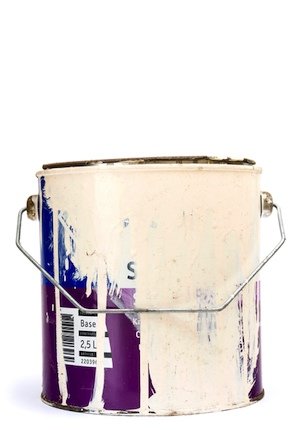

We may earn revenue from the products available on this page and participate in affiliate programs. Learn More ›
No matter what you’re painting—your home’s exterior, the living room, or the furniture you recently bought secondhand—every project seems to leave you with a frustratingly minute quantity of leftover paint, usually too little to keep for future use. So how do you get rid of it? Well, there are several ways to dispose of paint. The best method depends on the type of paint in question. Read on to learn how to dispose of paint that’s most commonly used in homes: latex, oil, and spray paints.
RELATED: Solved! Here’s How Long Paint Actually Lasts
Throw out leftover latex paint only after it is hardened.
Due to environmental concerns, leftover latex paint can neither be poured down the drain nor thrown directly into the trash. DIYers do have three options for how to dispose of latex paint, depending on the amount that remains in the can.

- If there’s really only a tiny bit left, either air-dry it or use up the remainder on some cardboard. You can then recycle the empty paint can, if not through curbside pickup, then at a local waste facility.
- If there’s more than a little paint left, take action to harden the paint. You can try materials you have on hand, such as sawdust or scrap paper, or opt for a waste paint hardener. The latter is readily available in hardware stores or from Amazon. Simply mix the hardener into the paint, closely following the instructions provided. Let it stand for the recommended period of time, after which the paint should be hard as a rock. You can now throw the can away (but you cannot recycle a can with hardened paint).
- Donate a nearly full can. If it’s a full or nearly full can and you simply no longer want the paint (and you cannot return it to the store where you made the purchase), call your local home resale store or a charity with an office nearby.
Oil-based paint qualifies as hazardous household waste and should not go in the regular garbage.
As such, it comes with limited disposal options. You may recycle a completely empty can, but things get tricky if there’s paint left. If you’re prepared to spend money to avoid a hassle, you may want to contact a hazardous household waste (HHW) facility to dispose of oil-based paint. Alternatively, consult your local government for advice, or contact the big-box home improvement store closest to where you live. In many counties, there are drop-off dates on which HHW material is accepted. A full (or nearly full) can of oil-based paint would be much easier to donate than to dispose of properly.
Recycle spray paint cans only if completely empty.
Half-full cans of spray paint are potentially dangerous; they can explode under heat or pressure. To be sure that you’re throwing out a can that is completely empty, spray the remaining contents on a piece of cardboard until you’re certain there’s nothing left. Once empty, add the can to your regular recycling.
As you can see, disposing of paint properly isn’t always a breeze. One thing is certain, however: No matter the type of paint, it’s easier to deal with an empty can than with one that’s half full. So if you’re stuck with a partially full can, you’ve now got a very good reason to get started on one of these smaller painting projects using leftover paint!
